Equipped to succeed: meet the women farmers turning the tables on climate change in Nepal
Some incredible people have already shared their stories with you as part of our Turning the Tables on Climate Change campaign – an opportunity for you to help farmers adapt to the new climate reality and succeed.
On International Women’s Day, we invite you to join us in celebrating the achievements of women farmers in remote areas of Nepal. These inspirational women are leading their rural communities towards a more prosperous future. The support of people like you means they’ve been able to learn the farming techniques and business skills they need to thrive.
You’ll also meet the women farmers we hope to work with in future in Nepal and find out how your support of our Turning the Tables on Climate Change campaign can help them adapt to the changing climate and thrive.
Meet Kandhari, Belkosha and Radhika…
Kandhari: working with other women to adapt to climate change
Women farming in remote areas of Nepal often find it particularly difficult to access up-to-date information about weather patterns, learn new business skills and tap into local supply chains.
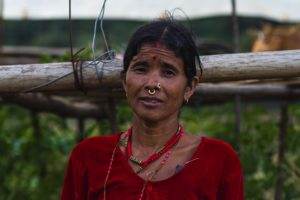
Kandhari on her thriving farm in Bajura, Nepal
We worked with Kandhari, a farmer in Bajura, to improve links between women farmers in her community. It’s helping them overcome discrimination and strengthen their livelihoods, despite the changing climate. The new farming co-operative we helped Kandhari set up means her vegetable farm is flourishing like never before.
“This year I just started selling vegetables in the market,” Kandhari told us, “I find this vegetable farming very profitable. I also recommend my fellow farmers start vegetable farming. I am now able to earn my own money and support my family.”
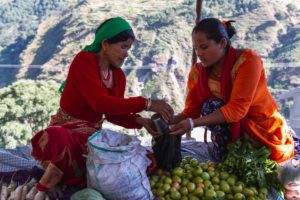
Kandhari and her daughter prepare produce for market
Thanks to new farming techniques, reliable market access and clear information on her incomings and outgoings, Kandhari is able to support her family and plan for the future:
“From the money I make from selling vegetables in the market, I am able to buy books for my kids and also I send money to my son in Butwal for his education.”
Belkosha: harnessing the power of gravity to improve her health and livelihood
Like many women in isolated Himalayan farming communities, Belkosha works every day on her farm. She’s also responsible for caring for her children and her husband’s older relatives. This “double burden” took its toll on her health, especially the frequent trips up and down the mountain to transport produce to market and bring back cattle feed and fertiliser.

Belkosha faced the challenge of lifting heavy loads up and down her farm’s mountainous terrain
“My farm is very remote,” Belkosha told us, “I used to spend many hours carrying heavy loads up and down the mountain. It damaged my health. Other women in community had the same challenges – it’s difficult to work on the farm when you are pregnant or have a baby with you.”
We worked with Belkosha to install a vegetable cable car for her community. This simple gravity-powered ropeway carries heavy loads up and down the mountain in minutes – it used to take Belkosha hours to carry them.
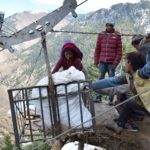
This veggie cable car means Belkosha can get her goods to market quickly and safely
“My health is much better now I don’t have to work quite so hard,” Belkosha says, “the ropeway saves me time, which I can spend with other women in the community sharing new farming methods and exchanging information.”
Radhika: passionate about empowering others
Radhika is one of the women farmers we hope to work with in the future in Nepal’s remote Dang area. She talked to us about how a lack of farming and business skills prevents her from fulfilling her potential.
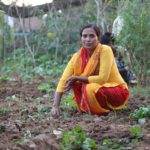
Radhika has struggled to make a success of farming on her remote farm
“Our community is isolated” Radhika told us, “we grow enough just to feed ourselves for a maximum of six months. To make a living for the remaining six months of the year, many people go to India or other countries to work.”
Radhika also shared her passion for empowering other women to make a success out of farming. “I think that women should be independent,” she said, “and should have the opportunity to learn farming skills. I want to end discrimination.”
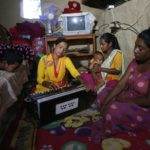
Radhika has composed a number of political songs on the subject of women’s empowerment
Imagine what an inspiring mentor Radhika could be to other women farmers if she had up-to-date knowledge and resources to supplement her determination. That’s why we want to work with more women farmers like Radhika – not only so they can succeed as individuals, but also so they can inspire and lead the women in their communities to even greater success.
You can help more women farmers succeed
With ingenuity, Radhika can overcome the new challenges created by the climate crisis and fulfil her ambition to empower other women to thrive as farmers.
Championing women in society to unlock their potential is a crucial driver in making all of this possible. With leadership training they can transform gender roles, participate in business, and have equal say in the future of their communities.